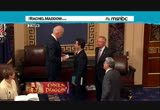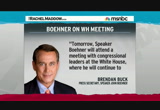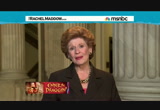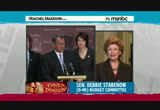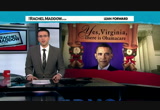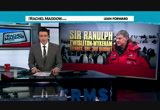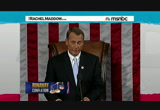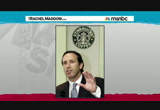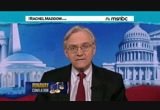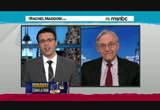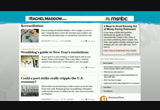tv The Rachel Maddow Show MSNBC December 28, 2012 1:00am-2:00am PST
1:00 am
have no water. >> look, i want you to respond really quickly. then i want to get a quote in. >> listen, the n word piece, we should throw that out. the thing is that tarantino's been clumsy about race in the past and that's what makes people sensitive to him using the n word or anything to do with race. >> salamishah tillet says, "and the emphasis on black exceptionalism has been a problem in the post-civil rights era. racial progress is too often determined by the exceptional success of people such as barack obama and oprah winfrey." and she makes a great point there, but at the same time can they be representative of the aspirations of the group at the same time? her point is brilliant but -- joe louis represented our interests. so did -- >> sure. sometimes exceptionalism works against the african-american community. but also they reflect our current moment. there's something to be said about the way race operates here and reflects our society today. >> dr. james peterson, thank you so much. that's "the ed show." i'm michael eric dyson in for ed schultz. "the rachel maddow show" starts right now. ezra klein is filling in for
1:01 am
rachel tonight. not django. good evening, ezra. >> good evening, michael. thank you very much. and thank you to you at home for sticking around for the next hour. rachel has a well-deserved night off. but today on the senate there was a rare sighting on the senate floor. especially around this time of year. right now the senate is usually a bit of a desolate place, but today at exactly 2:34 p.m. eastern standard time there was something big afoot. at 2:34 this afternoon in from the wings of the chamber walked the president of the senate, vice president joe biden. joe biden does not often serve in his capacity as president of the senate. but today was ditch. today joe biden had an incredibly important job to fulfill. >> do you solemnly swear to support and defend the constitution of the united states against all enemies, foreign and domestic, that you will bear true faith and allegiance to the same, that you take this obligation freely without any mental reservation or purpose of evasion, and that you will well and faithfully
1:02 am
discharge the duties of the office upon which you're about to enter, so help you god? >> i do. >> congratulations, senator. >> thank you. >> and welcome. >> congratulations, senator. stayed the united states senate got a brand new member. democratic -- democrat brian schatz of hawaii. senator schatz was appointed by hawaii's governor last night to fill the vacant seat of senator daniel inouye, who passed away a week ago. brian schatz got on air force one late last night. he touched down in washington early this morning. and he was a senator by this afternoon. that is a big day. so senator schatz, welcome to washington. welcome to the u.s. senate. there is a lot to catch up on. first of all, many of your new colleagues, most of the people you're about to join, they won their elections back in november. you of course did not. so it is possible that between november and now, like a normal human being, you were not paying all that much attention 20 what washington has been up to. it's the end of the year.
1:03 am
things have slowed down. we're waiting for a new congress to come in. usually you would have time to get your bearings to figure out where the bathrooms are. that is not going to be the case this year. not with the fiscal cliff. luckily for you, we here at "the rachel maddow show," we have been paying attention. we have had absolutely no other choice, unfortunately. and we are here to help you and everyone else trying to figure out how we got to this point we are in. right after that election, the day after the election, in fact, your new colleagues got to work immediately on the cliff. the day after the collection, republican house speaker john boehner put out this stirring call to action. >> mr. president, this is your moment. we're ready to be led. not as democrats or republicans but as americans. we want you to lead. not as a liberal or conservative but as president of the united states of america. >> mr. president, we are ready to be led. just show us the plan. that was encouraging. that seemed like we were going
1:04 am
to have a deal, no problem. obama won the election. he'll hand them a plan. he'll make some small changes. that's how congress works, of course. pass it and we'll be done. we'll go home for christmas. not so much. president obama did hand them a plan as treasury secretary tim geithner made a special trip all the way to john boehner's office on capitol hill. he delivered the plan to speaker boehner, a plan pretty much identical to the one president obama just won the election on. you might have thought that would have been leading, the problem would have been solved. not so much. >> flabbergasted. i looked at him, you can't be serious. i've just never seen anything like it. >> so when you said you wanted to be led, you just wanted a plan, that was a joke? so the white house agreed, then, no more leading, that was not what their partners in the house of representatives wanted. instead, white house and boehner entered into intense lengthy negotiations. and by the end of them they seemed really close to a deal. the white house had agreed to
1:05 am
cut their tax ask by about 400 billion, to increase their spending cuts by another 400 billion and only ask for about half as much stimulus. they moved toward boehner by more than a trillion dollars. that was a lot of concessions from the team that had just won the election big. and they made them because they thought boehner was ready to say yes, the fiscal cliff would be averted, we'd have a good christmas and happy economic fun times for the economy would be right around the corner. they were wrong. >> we are nowhere when it comes to the fiscal cliff talks. let me tell you what's going to happen today. speaker john boehner, the republican speaker, is going to try to pass what he calls his plan b, which would just simply address tax rates for those making a million dollars or more and that's it. >> john boehner walked away from the obama administration's third offer. a giant, giant compromise. so he didn't like it when they led. he didn't like the 2340eshing. he decided instead to chart his own course called plan b.
1:06 am
plan b was supposed to show president obama that republicans had their own solution and instead of bothering with his offer they would just go ahead and pass their own plan without him. that was the idea, anyway. >> there is breaking news to report tonight out of washington. strange breaking news out of washington. within the last hour republican house speaker john boehner appears to have completely lost control of his own caucus. just about an hour ago john boehner was forced to pull his own plan off the floor because it turns out he did not have the votes from his own side to pass it. he didn't have enough republican votes to pass the republican plan. >> senator schatz, this is now your life. i know that speaker boehner is in the other chamber, but this is what you need to know right now about boehner and his colleagues. john boehner is somebody who just a week ago was essentially humiliated by his own caucus. when he stood before them on that night, on the night plan b went down, and begged them to
1:07 am
please follow him. and then to go before them when they didn't, he actually read the serenity prayer aloud. he read it to his own members. he said to all of his members, "lord, grant me the serenity to accept the things i cannot change. that is not the prayer you say when you know what you're going to do next. it is not the prayer you say when you even have a plan. it is a prayer that you say when all of your other plans have, well, gone to hell. john boehner walked out of that conference with his members, and he released a statement that essentially said, i tried but i'm out. he wrote, "the senate must now act." senator schatz, that is where you and your chamber come in. now, at times in the last couple years this has actually worked. when the house can't come to an agreement with the president, the democratic leader in the senate, harry reid, and the republican leader mitch mcconnell have come together and they have saved the day. they did it again and again. it happened in 2010, when mitch mcconnell actually worked with joe biden to extend the bush tax cuts and they got a bunch of stimulus passed.
1:08 am
it happened in 2011 when reid and mcconnell were key in resolving the debt ceiling fight. and people thought it could happen again this time. what's different now is mitch mcconnell is up for re-election. and it is weird to say this aloud, what i'm about to tell you. i have never even thought about how weird it is to say until tonight's broadcast. but the person mitch mcconnell has in his head right now, the person he's maybe a bit afraid of, is ashley judd. yeah. that ashley judd. >> don't cry. don't cry. you're going to be fine. >> okay. >> mitch mcconnell's up for re-election potentially against ashley judd. she might be running against him. and she's polling well. they're only about four points apart. so he doesn't want any trouble. he certainly does not want a conservative primary challenge that will weaken him before the judd juggernaut. so he's decided to not really take any part in these negotiations right now. instead he came out and said "it is the president's job" -- this is a quote. "'s it is the president's job to
1:09 am
find a solution that can pass congress. he's the only one who can do it. this isn't john boehner's problem to solve." seriously. that is what he said. he said don't blame us, we're just the speaker of the house of representatives and the minority leader of the u.s. senate and the guys who aren't allowing the president to pass his plan. but you know, we've got nothing to do with this. you know, congress comes first in the constitution. tax bills -- and this is going to fundamentally be a tax bill when we pass it. they have to begin in the house of representatives. they can't originate in the white house. the president can't write legislation or pass it himself. the founders would have been shocked to hear congressional leaders talking this way. but put that aside. mcconnell basically said to reid i can't help on this one. how did harry reid respond? this way. >> speaker boehner should call members of the house back to washington today. he shouldn't have let them go, in fact. they're not here. they are not here.
1:10 am
john boehner seems to care more about keeping his speakership than about keeping the nation on firm financial footing. >> right. so that's pretty much where we are now. boehner's out, mcconnell's out. reid says it's up to boehner, white house can't get boehner to talk to them. it's kind of a mess, senator schatz. and it is now part of your party. so what is the next move? there is late news tonight that president obama will convene a meeting of congressional leaders at the white house tomorrow afternoon to discuss the current impasse. and to give you a spirit of the compromise and sense of goodwill toward men in which republican house speaker john boehner is approaching this meeting here is a statement we were e-mailed by brendan bock. "tomorrow speaker boehner will attend a meeting where he will continue to stress that the house has already passed legislation to avert the entire fiscal cliff and now the senate must act." so that's helpful.
1:11 am
senator schatz, i know you probably just checked into the marriott capitol hill or something, but i don't know, you got any ideas? joining us is someone who i hope will have ideas. democratic senator debbie stabenow. senator stabenow, thank you for being with us tonight. >> absolutely, ezra. and i wanted to thank you for what is a very good summary of where we are. and it is the most frustrating thing i've ever gone through in my entire life, i think. >> i appreciate that. and covering it, what has been striking to me is the level of not just substantive disagreement on things like tax and spending but the procedural breakdown. every procedural effort that gets begun to solve this, either negotiations or the house plan b or maybe reid and mcconnell negotiations, it is dissolving very, very quickly. so what comes now? what is actually the process by which we can move forward? >> well, first of all, we have to be able to govern.
1:12 am
we have to have an adult conversation, getting people in the room who actually want to solve this problem. and i think it's very important to step back and see the fact that we have already -- there are three parts of this deficit reduction stool. we've already in the past two years passed $1.6 trillion in spending cuts. we've passed over $700 billion in savings in medicare through reforms like cutting back on overpayments to insurance companies. the one piece of this puzzle that we've not been able to get any support for is making sure that the wealthiest among us help solve this problem by being willing to pay a little bit more to be part of the solution. so we have sent a bill to the house back in july, bipartisan bill that says what -- everybody says they don't want middle-class families to have their taxes go up, well, fine.
1:13 am
why don't we start with something we can agree on, which is that? and just pass that. why doesn't the house just pass that? but as we know, the speaker couldn't even pass his own plan to say that up to a million dollars was exempt from tax cuts. so what they're doing is holding middle-class families hostage right now, trying to find some maneuver where the wealthiest people continue to get extra tax cuts that we just can't afford. so i'm not sure what's next. i can tell you the senate's here. we're in session. we had votes tonight. the president's here. i'm the eternal optimist. there are certainly things we can do including pass the farm bill that we passed last june that has $24 billion in savings by cutting subsidies for wealthy farmers. so there's a lot of things that we can do, but it's going to take the speaker deciding he
1:14 am
wants to work across the aisle to get it done. >> but can the speaker work across the aisle? one thing that has been very -- i think an important theme of the last couple years but particularly the last week or two is whether or not boehner has the influence in his own conference to pass these bills, whether or not he is actually a negotiating partner who can be negotiated with. and certainly before january 3rd, when he comes up for re-election as speaker. do you think that anything can actually happen before then, or do you think some of this is about boehner trying to wait until after that election is done and at least he is entrenched for another two years? >> well, the prevailing thought now is that the speaker won't do something until after his election vote on january 3rd. could he? yes. in fact, he could take at least half of his caucus or more, combine them with at least half the democrats or more, and actually govern. and frankly, as -- people in michigan are telling me, my
1:15 am
family and friends, over christmas, is that they really want us just to sit down and work together and get something done. and when we're talking about an average of $2,200 in increased taxes potentially on a middle-class family, you know, i have one woman say that's four months' groceries for her kids. people here may think this is some kind of chess game. this is serious business. it's serious for the economy. it's serious for families. and you know, it's pretty hard to see this thing go round and round and round like it is. >> senator debbie stabenow of michigan, thank you very much for your time tonight. >> you're welcome. >> so maybe the super dangerous mess in washington is the fault of both sides. that's what people say. i mean, there are plenty of people who say that in public all the time. except that it is not. and we can prove it to you. that bit of business is coming up.
1:19 am
have you ever been to hobby lobby? if you're in the market for fake flowers or beads or yarn, you may find yourself in a hobby lobby. now, me, i'm not so good at the crafting. this is my handwriting. i can barely use a pen, much less actually fold anything or use scissors. you don't want me around scissors. but many americans do know their way around a hot glue gun, as evidenced by the existence of 525 of these hobby lob write stores spread all across the country. the hobby lobby chain was founded by a guy named david green. he's still the ceo and worth $4.5 billion, which is a lot. according to the store's statement of purpose, however,
1:20 am
mr. green's main goal in founding his crafting empire was ton sell scrapbooks or construction paper or even to make billions of dollars. it was to honor the lord and operate the company in a manner consistent with biblical principles. those principles included refusing to provide insurance coverage for emergency contraception to his more than 13,000 employees. under the terms, however, of the affordable care act, which is now the law of the land, beginning on january 1st mr. green has to provide that coverage. he does not have a choice. so he sued. quoting mr. green, "we simply cannot abandon our religious beliefs to comply with this mandate." supreme court justice sonia sotomayor has weighed in on the case yesterday. she declined mr. green's right to decline emergency coverage to their employees. she said they failed to prove their case. a lower court already ruled against hobby lobby by pointing out that while churches and other institutions do not have to provide birth control if it
1:21 am
violates their beliefs a for-profit arts and crafts store, no matter how religious the father, is not a church or religious organization. so no, you can't tell your employees what kind of contraception they may get through their insurance. so that happened. it is another legal victory for the affordable care act at the supreme court. it didn't get as much attention as the last time the court ruled on obamacare, but it's a big deal. it's one more thing the bill does not have to worry about. we have talked about the affordable care act for so long, it seems almost theoretical, like a dragon, and when we talk about it it's almost always conditional. would it pass? would it survive the supreme court? would it be repealed? and partially that has been an organized and orchestrated republican strategy to fill the country with doubt about whether or not the bill is actually a real thing. but now the bill is actually really happening. parts of it are going into effect as we speak. 2014 is the really big year for the affordable care act. that is the year when it really
1:22 am
begins insuring millions and millions of americans. but a lost important parts of it are going into effect in 2013, this year, this coming year. my "washington post" colleague sarah cliff put together a really handy list over at wonkblog, about how obama care is going to change health care in this country starting in just a few days. number one is starting in january families making more than $250,000 a year are going to pay significantly higher taxes. that new revenue is going to add up to more than $200 billion in the next decade to finance obama health care. it's a fact about the law that's often missed even as we're arguing about raising taxes on rich peel. obama care does raise taxes on rich people to pay for health insurance for poor people. that is fact number one. number two, as you are ringing in the new year, think about the fact that health care for the poor will actually be improving this year. there are more than 50 million people on medicaid. medicaid is the main program used to give health care to the poor and to the children in this country. medicaid is super cheap. it is way, way cheaper than
1:23 am
private insurance or medicare. and in part it is so cheap because it pays doctors a lot less than those programs do. that means a lot of doctors, particularly primary care doctors, don't want to participate in medicaid or they can't afford to. so a lot of folks on medicaid have trouble actually getting care. doctors who accept medicaid coverage are going to see a 73 -- primary care doctors i should say. a 73% raise in 2013. which means those folks will have more access to more doctors. so we're not just expanding health care for the poor in 2014. starting in 2013 we're making it better health care. that is fact number two. number three, your insurance pan will no longer be an impenetrable document filled with legalese. it will probably look more like this. still words on a page. you've got to read something. but not that many of them. straightforward, easier to navigate, and thus harder for your insurer to fool you about what is actually covered. that is change number three.
1:24 am
and starting in october of 2013, the online health insurance markets at the core of the bill, they will open up for business. any american will go able to go online and compare plans, maybe even read reviews. it's kind of like amazon.com for health insurance. happy new year. 2013 the year of the affordable health care act becomes actual real reality. once upon a time there was a
1:28 am
now not so much. we've been pretty much everywhere on earth. up almost all the mountains. although nobody has made it to the summit of canada's mount saskatchewan yet. filmmaker james cameron this year made a solo dive seven miles down to the bottom of the mariana trench. we've had a guy parachute from the stratosphere, 24 miles up. and so now we are at the point where we're having to go back to what were once the big landmarks and do them again but in harder ways. it's not enough to go to the south pole before. that's been done. norway got there first. heck, going to the south pole, it's so easy these days the prime minister of norway has done it. and there were microphones there when he did. not enough to cross an accurate ka. it's been done a number of times. it's not even enough to cross it on foot. sought next big adventure at the end of the earth, to cross antarctica in winter. and the expedition that is going
1:29 am
to do it set out earlier this month from england. but wait, you say, it's winter here. then right now pts summer in antarctica. and you're right. but don't call shenanigans yet. the expedition is going to take a bit of time to get to antarctica. then the explorers have to do some prep work to set up. then they will head out on foot followed by tractors across the vast iciness that is antarctica in what will be pretty much total darkness for months, enduring temperatures at 94 below zero. 94 below zero. this is the guy who is leading the expedition. he is kind of an amazing guy. the guinness book of world records calls him the world's greatest living explorer. he's a member of the british aristocracy. the third baronette of bamberry. you can look him up in your copy of dembridge's piritch. we looked him up in our copy. his full name. ranulph twisleton-wykehan- fiennes. he was once considered to play the role of james bond before roger moore. he ran seven marathons over seven days in six continents
1:30 am
only missing antarctica because of bad weather. of course he'd already crossed antarctica by foot when he missed it that time. he has survived a literal heart attack on the slope of mount everest. and he once had such a bad case of frostbite he amputated the ends of his own fingers with a microsaw. that is the rather bad-ass dude who is setting out to make what he is dubbing the coldest journey. now, mr. twisleton-wykeham-fiennes. that is an amazing name. is also the third cousin of the actor. ralph fiennes is a great actor. he played the heck out of voldemort, which is not easy but as far as i can tell he has never had to put his hand in a vise so he can cut off his own fingers. and that i have decided is a standard by which all twisleton-wykeham-fienneses will
1:31 am
be judged from here on out. so good luck and god speed, the finest of the twisleton-wyke ham clan. i love it because it includes two of my favorite things, celebrity gossip and crazy feats of human endurance. what it doesn't include is my most favorite thing, charts. but this show does. we have the very best charts of the whole year, including paul krugman's favorite chart, coming up later.
1:34 am
we joked a bit on last night's show about starbucks' plan to solve the fiscal cliff by writing the words "come together" on people's. you err mint mochas and cups of joe. tonight i want to take this more seriously because i admire this effort. ceos and coffee drinkers alike should want to engage in politics. they should be angry at what they see happening p. they should be trying to work out ways to make politicians work better. but this ideology of come togetherism that animates the effort, it's very common, and it's not just wrong. it's actually i think part of the problem. the idea that the problems in
1:35 am
washington would be solved if the two sides would just "come together," it's actually i think at this point one of the reasons nothing in washington ever seems to get solved and the two sides never seem to come together. it's counterproductive. and to see why i think we need to get specific. here are three facts about the budget debate we've been having over the last couple of years that say a lot about what it would mean for washington to come together. fact number one. simpson-bowles, a bipartisan debt reduction plan that people hold up as the very platonic ideal of coming together, simpson-bowles is by any reasonable accounting far to the left of anything the white house has ever proposed. it's got $2.6 trillion in tax increases. 2.6 trillion. more than twice as much as what the white house is currently asking for. it's got many, many more defense cuts than the administration has ever even considered. republicans hate it, simpson-bowles, the come together plan. paul ryan, the big deficit guy, or so he says, he was on the simpson-bowles commission, and he voted against it, as did every other house republican on
1:36 am
the commission. the white house saw no reason to embrace something that raised taxes so sky high and so the white house brought out something that was frankly to the right of simpson-bowles. their budget was to its right and they thought it had a better chance of passing. they thought it was a compromise. but the house republicans did not respond the same way. when they brought out the ryan budget, which was their budget alternative, they didn't compromise. they went way to the right. there was no compromise in it at all. that is fact number one. number two, in 2010 republicans won the midterm election. 2011 the white house agreed to a deal that was all spending cuts. it is the budget control act. it cuts spending by $1.8 trillion over the next decade. except for an increase in pell grants, the bill is all cuts, no taxes. and democrats agree to that. they agreed. that is fact number two. fact number three. at this point even after winning the most recent election the
1:37 am
white house has moved much farther toward boehner than boehner has moved to the white house. from their first offer in november to the last one the white house has dropped what they want on taxes by $400 billion, raised their proposed spending cuts by the same amount and lowered their demand on stimulus by about another 250 billion. and they've stopped asking end the debt ceiling forever entirely. boehner has increased his offer on taxes by about 150 billion, dropped his spending cuts by 330 billion, and has never offered significant stimulus or a major concession on the debt ceiling. so in every category since obama won the election he has moved further toward boehner than boehner toward him. yet it's boehner who walked away from the talks with his plan b, who failed to pass it and said it's the senate's problem now. democrats won more votes at presidential level, senate level and house level. boehner is speaker today because of the way the districts are drawn. but his arguments did not win.
1:38 am
and yet he's not really moved. i don't think you can look at the last three years and sate white house has not tried to come together with republicans. i also don't think you can look at the last three years and say the republicans have tried to come together with the white house. and so here is what is supposed to happen. the american people who overwhelmingly say they want compromise, who say they want a plan similar to what the house is offering, a plan that raises taxes on the rich and cuts spending, they're supposed to punish the republicans for not compromising. and arguably they did that this year. democrats won the election. but what's weird is at the elite level and the elite level matters in politics. the elite level gets through to politicians in between elections. at the elite level you've got folks in the media, powerful ceos, people who run interest folks, and a lot of these folks, they want to keep up relations on both sides of the aisle, and so they find it safer to blame both sides for not coming together than to blame one side for not allowing any coming together. >> the battle over how to avoid going over the fiscal cliff
1:39 am
ramped up today as both sides were long on rhetoric and threats but short on actual movement. >> i think both sides deserve some blame here. >> chris, i'm not certain there's not politics on both sides. >> again, i thinks there's intransigence on both sides. >> with all respect it seems like both sides seem to be we're waiting for them, we're waiting for, this we're waiting for, that but the fact is nothing ever gets done. >> blaming both sides instead of pointing fingers when pointing fingers is warranted breaks the system. it hurts the mechanism, the fundamental mechanism of accountability. it protects republicans or anybody who doesn't want to compromise. they can be intransigent, and they won't feel the full consequence of their position. they can refuse to take good deals. and while they'll get blames for that so will the other side. the democrats will get about half the blame. d.c. is not equivalent right now. the two sides are not the same in their willingness to come together. and those of us who want to see these problems solved, who want
1:40 am
to see everyone come together, who want to see compromise get struck, we don't just need to talk about how politicians should come together. we need to actually point our fingers at the people breaking it apart. washington post columnist e.j. dionne and also senior at the brookings institution joins us. good to see you. >> it is good to come together against false balance. >> i actually want sku something, e.j.-b the business community on this. you've had this big group of ceos, fix the debt, which schultz is a part of. early on it seemed they were going to exert a lot of influence and they've not actually seemed that powerful and certainly not that powerful in moving the republican party. why do you think that is? >> you know, i think that the business community never acts as a unified block. there are lots of pieces of it. secondly, the business community over the last 20, 25 years has moved to the right of where the business community used to be. in some ways you can see that in the political views of george romney versus the political views of mitt romney.
1:41 am
and third, i think that in the republican house conference john boehner is far more worried about 35 to 70 of his most right-wing members for now anyway, especially going up to the vote on january 3rd for speaker than he is about the business community. but i also think this false balance is part of it, that the business community, like some in the media, seem to think you have to pretend to be equidistant from the parties even though the parties are not equidistant from the center or inclined to compromise, as you showed, one to the other. president obama has given a lot more ground, sometimes to the consternation of his own party, than the republicans have. >> when i watch the sort of political strategy of a group like fix the debt or just many folks in general, many in the media, the animating underlying impulse seems to be a belief that what will lead to
1:42 am
compromise is kind of a spirit of cooperation, everyone being nice to each other. so when people stop being nice, they get upset. and i kind of wonder, i've begun to real wonder in washington whether or not that is right. because what seems to happen is you get that spirit of cooperation and negotiations and then they break apart as the outside interests come in. it seems at this point possible, at least in terms of the white house's strategy, that they would be more effective at getting compromise by being somewhat less cooperative with republicans, by using more of an outside game, bringing more pressure to bear instead of negotiating just kind of pressuring the republicans until presumably they might break, at least if the white house is on the side of public opinion. >> well, you've already seen a little of that from the election. after the blowup of 2011, where we almost wrecked the country's credit over the original debt ceiling fight, the president said okay, they're not willing to agree to anything, i'm going to have a big public fight about this. and even flawed as it was, at least plan b acknowledged that it was time to raise taxes. so by going on the offense, the president actually changed the terms of debate. the problem is that in the house
1:43 am
there are still enough republicans to block the party as a whole from saying all right, we'll agree to some tax increases. and my view is that there is an easy way out, which would be -- not easy for john boehner, but it's structurally easy. let the house work its will. you could easily put together a coalition of democrats and republicans who want to governor around something like what president obama put on the table. but that is not allowed to come to a vote, and the republicans are still scared of their right wing even though this election showed them that they can't keep moving to the right and expect to win. >> e.j., you're always balanced and you're never false. thank you for being here. >> bless you. good to be with you. not only can i explain this whole year using lines and grids, i cannot wait to do it. a 2012 graphic geek-out deluxe paul krugman approved, coming
1:47 am
imagine that in the past couple of months there had been mass defections in the u.s. government. imagine the speaker of the house denounced the president and defected, fleeing the u.s. for, say, can canada and taking with him a couple of people from the president's cabinet and high-ranking generals. the spokesman for the state
1:48 am
department defects too and not apparently does she denounce her loyalty to the old administration and the whole american government she does so after promising the world that the president would never, ever use chemical weapons on his own people. she says he won't do that. and then she disappears. then a prominent attorney general and the chiefs, they denounce the government too and they flee. they leave the united states. and now imagine these are just a few of the more than 70 high-level defections from president obama's government. that is obviously not happening here. it is what is happening in syria. that is what is happening to bashar al assad. dramatic high-level defections that show no signs of slowing down while a civil war rages on. more and more it seems people in the regime do not believe the government will win, and so they are abandoning it. assad's chief of military
1:49 am
police, his defection enforcer, this week was almost poetic, before defecting his job was to stop other people from defecting. his department was literally tasked with shoring up the loyalty of the armed forces. and he didn't just easily and casually walk out of the country. according to opposition figures, who talked to the "new york times," he planned his escape for weeks and it "ended with a four-hour sprint by motorcycle to the turkish border, driving through woods and on muddy roads." the syrian spokesperson, the one who said publicly that the assad regime would not use chemical weapons on his people, he supposedly left weeks ago, and no one seems to know where he even is. the guardian reports he might be in the united states working with intelligence officials. something the state department denies. meanwhile, an opposition activist makes public this conversation he reportedly had with a guy over twitter overt summer. in it's spokesman says he's sympathetic to the opposition. and yet today he's still missing. what is happening in syria right now is chaotic on every level.
1:50 am
in the streets and in the government. and it is deadly. more than 40,000 people have been killed. according to human rights groups. when i have that much chaos and that much destruction and so many possible branching outcomes with this many lives at stake, you turn to an expert. and we have one. joining us now from cairo is ayman mohyeldin, foreign correspondent for nbc news. thank you. it's great to see you tonight. >> thanks, ezra. >> give me your broader take for a minute. where are we on the scale of regime collapse? >> wow, that's a very tough question. i think by anyone's estimates including intelligence analysis and even opposition activists it's very difficult to gauge that. those who are fighting on the ground will tell you that in the last few weeks there have been significant gains and many people have used the expression "this is the beginning of the end," not the end but the beginning of the end. how long that lasts for depends on all kinds of variables. but the term is being used more frequently among opposition activists and those players here in the region. >> are these defections, are they and we have one. joining us now for ren correspondent for nbc news. thank you it is great to see you tonight. >> give me the broader take. where are we on the scale of the
1:51 am
regime collapse? >> that is a tough question. by any one's estimates. it is difficult to gauge that. those that are fighting on the ground will tell you in the last few weeks there have been significant gains. how long that lasts for depends on variables. >> are these defectses are they going to be replaced is the regime at a point where it can be reflent issue itself? >> there is no doubt that over the course of the last several months, the government is quick to fill that gap. president assaad has addressed this issue in many interviews. he says that it withers down the hard-core loyalists in the regime. he says they have the right to leave. people see it more to the complete shock to the moral. it is more of a psychological blow to the regime and the ability to carry out the daily functions. there is no doubt that the defectses have had a tremendous in pact on the circle. russia is signaling that it would accept a signal. how do you read that? >> the russian position over the course of the last several months has shifted a little bit. you can clearly see by the time
1:52 am
of the geneva meeting. the russian government says they are willing to accept a trational government. it is up to the syrian people to decide. it is not up to the u.s. or united nations to decide. they emphasize it must be the syrian people. many ininterpret that that they don't have to stay with the president. they see that as an opening that they would have to have a process that would call for his removal. that is what we heard from the on voy. so long as it is decided on by the people. >> thank you very much for joining us. one of the most beautiful words in the epg lash language graphs coming up. when i'm not sitting in for rachel i'm at the washington post writing a blog. each year for the end of the year we ask our fellow travelers in the great wide world to send in their favorite graph. north dakota, senator kent conroy he sent a graph this year that was useful on capitol hill
1:53 am
this year. it showed the last tax budget we had. five points higher than it was now. tax revenues right now. about the lowest we have seen. you need for laxes to balance the budget. you see the growing divide here between the rich and the poor when it come to the amount of debt that they have. it shows the debt by the top richest five americans and it is falling now. the blue line shows the line for the bottom nine percent. this kind of debt simply cannot hold. her chart ends in 2007. the great economist graced us with a one line graph. that is the share of the national product that is going
1:56 am
when i'm not sitting in for rachel i'm at the washington post writing a blog. each year for the end of the year we ask our fellow travelers in the great wide world to send in their favorite graph. north dakota, senator kent conroy he sent a graph this year that was useful on capitol hill this year. it showed the last tax budget we had. five points higher than it was now. tax revenues right now. about the lowest we have seen. you need for laxes to balance the budget. you see the growing divide here between the rich and the poor when it come to the amount of
1:57 am
debt that they have. it shows the debt by the top richest five americans and it is falling now. the blue line shows the line for the bottom nine percent. this kind of debt simply cannot hold. her chart ends in 2007. the great economist graced us with a one line graph. about the lowest we have seen. you need for laxes to balance the budget. you see the growing divide here between the rich and the poor when it come to the amount of debt that they have. it shows the debt by the top richest five americans and it is falling now. the blue line shows the line for the bottom nine percent. this kind of debt simply cannot hold. her chart ends in 2007. the great economist graced us with a one line graph. that is the share of the
1:58 am
national product that is going to workers rather than capitol. remember when mitt romney said that almost half of all americans are free loaders? >> 47% of the people will vote for the president and 47% who are with him and believe they are victims and believe that the government has the responsibility to care for them and believe that they are entitled. they will vote for this president no matter what. the president starts off with a huge number. these are people who pay no
1:59 am
income tax. >> you can see here, other folks who didn't pay income taxes, they were working and paying income tax. the final slice of people not paying the federal income tax, they were in school or sick or retired early. speaking of mitt romney, demographics matter. and also from the chart he sent in. big city on the right. the red line shows support for mitt romney. the blue line support for obama who one big in the cities. this is part of the story of the 2012 election and maybe the never several elections. sam wang had an accurate
145 Views
IN COLLECTIONS
MSNBC West Television Archive
Television Archive  Television Archive News Search Service
Television Archive News Search Service  The Chin Grimes TV News Archive
The Chin Grimes TV News Archive 
Uploaded by TV Archive on

 Live Music Archive
Live Music Archive Librivox Free Audio
Librivox Free Audio Metropolitan Museum
Metropolitan Museum Cleveland Museum of Art
Cleveland Museum of Art Internet Arcade
Internet Arcade Console Living Room
Console Living Room Books to Borrow
Books to Borrow Open Library
Open Library TV News
TV News Understanding 9/11
Understanding 9/11

